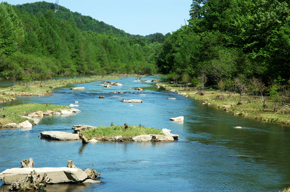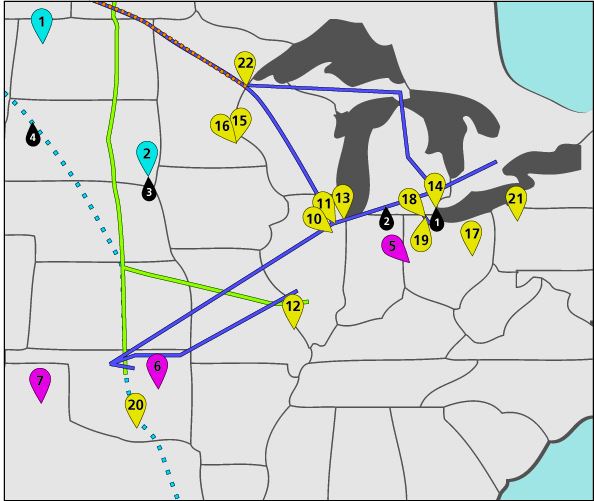Texas Water District Continues Legal Battle for Oklahoma Water

A U.S. District judge gave the water district one month to clarify its case for claiming Oklahoma’s water sale ban is unconstitutional.
Tarrant Regional Water District (TRWD) will file an amended lawsuit Friday December 18 against the State of Oklahoma, continuing its legal battle to gain access to Oklahoma’s water, said Wayne Owen, planning director for Tarrant Regional.
The Oklahoma legislature, established in 2001, enacted a moratorium on all water sales outside the state, but TRWD says this act violates the commerce clause of the U.S. Constitution. The Supreme Court has established that this clause prohibits states from enacting laws that interfere too much with interstate commerce.
On November 18 U.S. District Judge Joe Heaton gave TRWD 30 days to clarify its claims. Judge Heaton said TRWD’s assertion that the moratorium restricted future water deals was “too speculative and uncertain,” according to the Dallas Morning News.
“Due to embargo on sale of water out of state, Tarrant had not been thwarted in attempt to buy,” Owen told Circle of Blue. “We had to show past attempts that had failed.” TRWD itself did not try to buy water. It had applied for a water use permit from the Oklahoma Water Resources Board and was denied.
Owen cited two examples to be included in the amended lawsuit — the North Texas Municipal Water District tried to buy water from Hugo Reservoir in southern Oklahoma in the late 1990s while the North Texas Water Alliance tried to do the same, without success, in the early 2000s.
Tarrant’s Plan
Tarrant supplies water to 1.8 million people, including the cities of Arlington and Fort Worth. The water district has enough supplies to meet projected demand for the next 20 years. The water from Oklahoma would be used for demand after 2030. Meanwhile the population of TRWD’s supply region is expected to reach 4 million by 2060.
“The strategies we are pursuing are low cost and take into account the water-energy nexus,” said Owen.
The most cost-effective supply options for TRWD are Cache and Beaver Creeks, but the key is to capture the water before it enters the Red River, which has high chloride concentrations that would require expensive treatment before municipal use, Owen said.
Even though TRWD claims this is excess water, it would still have an effect downstream, some argue.
“The problem is that when large quantities of water are pulled before it mixes with the Red River, the salinity goes up in the river,” said Oklahoma State Senator Jerry Ellis to the Oklahoma Magazine. “The quality and quantity of water is going to go down.”
TRWD would divert approximately 150,000 acre-feet of water per year from the two creeks by directing it to the west fork of the Trinity River. TRWD estimates this would cost $445 to $475 million and would be paid with a bond issue, Owen said.
If TRWD is not able to get water from Oklahoma, the alternatives will be costly and require a lot of energy to move water a long distance, Owen said.
“Here in Dallas-Fort Worth the alternative water supply options have us going to the Texas-Louisiana border 250 miles away – to the Toledo Bend on the Sabine River,” Owen said. “Another option is a large lake slightly closer to Dallas-Fort Worth. It’s the largest undeveloped reservoir in Texas, but nearly 200 miles away.”
Whether Oklahoma has ‘extra’ water is still being studied. Oklahoma is undergoing a comprehensive assessment of its water resources, which will be completed in late 2011, a press officer for the Oklahoma Water Resources Board told Circle of Blue.
The state is holding a regional meeting to get input from stakeholders. A state-wide meeting will be held in May 2010 to compile the regional recommendations and formulate a state water policy, the water board press officer said.
The Oklahoma Water Resources Board declined to comment about the legal proceedings, referring all questions to the Attorney General’s office. The Attorney General’s office said it believes Oklahoma has the right to regulate its water resources, but did not want to comment on the amended lawsuit before it is filed.
Uncertain Outcomes
A parallel legal battle is occurring between Oklahoma and Irving, Texas. The Irving City Council agreed on a contract in 2008 with the Hugo Municipal Authority to buy water from Hugo Lake in Oklahoma, according to the Dallas Morning News.
Hugo city officials view water as an economic resource that could help one of the poorest areas of the state, according to Oklahoma Magazine.
TRWD has hinted that it might join Irving as a co-buyer or might buy water directly from Irving. But Owen said he hopes that the sides can negotiate a sale instead of the water being transferred by declaration.
“An ideal outcome would be recognition that Oklahoma possesses a tremendous resource that could be sold to their neighboring state just like they sell gas, oil, or wood and that water could be an asset based on Oklahoma’s abundance.”
Source: Dallas Morning News, Oklahoma Magazine
Read Circle of Blue’s series about water conflicts in the United States
Brett writes about agriculture, energy, infrastructure, and the politics and economics of water in the United States. He also writes the Federal Water Tap, Circle of Blue’s weekly digest of U.S. government water news. He is the winner of two Society of Environmental Journalists reporting awards, one of the top honors in American environmental journalism: first place for explanatory reporting for a series on septic system pollution in the United States(2016) and third place for beat reporting in a small market (2014). He received the Sierra Club’s Distinguished Service Award in 2018. Brett lives in Seattle, where he hikes the mountains and bakes pies. Contact Brett Walton











Leave a Reply
Want to join the discussion?Feel free to contribute!